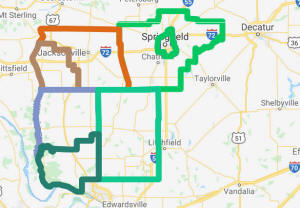State lawmakers approve remap of judicial subcircuits
 Send a link to a friend
Send a link to a friend
[January 06, 2022]
By PETER HANCOCK
Capitol News Illinois
phancock@capitolnewsillinois.com
 SPRINGFIELD – Illinois lawmakers on
Wednesday passed a bill to redraw judicial subcircuit maps in Cook
County and some of the surrounding collar counties while creating new
subcircuits in several additional counties. SPRINGFIELD – Illinois lawmakers on
Wednesday passed a bill to redraw judicial subcircuit maps in Cook
County and some of the surrounding collar counties while creating new
subcircuits in several additional counties.
The House gave its final approval shortly after 10:30 p.m. Wednesday,
and the measure passed both the House and Senate with only Democratic
support, clearing the way for the changes to head to Gov. JB Pritzker.
The proposal was introduced on the first day of the 2022 session and
appeared to take Republican lawmakers by surprise. They argued that
there had been little focus on creating additional subcircuits outside
of Cook County during public hearings of the House and Senate
Redistricting Committees in recent months.
Democrats, however, said the idea had long been on the table since the
General Assembly passed a law mandating the redrawing of existing
subcircuits following the 2020 census.
“The law did not mandate that anything be done in these other counties,
but it did elicit a conversation about subcircuits across the board,”
Senate President Don Harmon, D-Oak Park, said during a committee
hearing.
Harmon said the proposal does not add any new judges to the state’s
trial court system but only changes the way some judges are elected.
Most of the changes would not go into effect until the 2024 elections.

The proposed amendment to House Bill 3138 would redraw judicial
subcircuits in Cook County for the first time since 1991 as well as
subcircuits in Kane, McHenry and Will counties for the first time since
they were originally enacted in 2005.
It would also increase the number of subcircuits in Cook County to 20
from 15 so that as judges who are currently elected countywide retire,
they would be replaced by judges elected from subcircuits.
The same would be true for Lake County, where the proposal would double
the number of subcircuits from six to 12.
[to top of second column]
|

A screenshot depicts the 7th Circuit judicial
subcircuit plan approved by Democrats in the Illinois Senate
Wednesday night. Several other counties will also have new
subcircuits under the plan. (Credit: www.ilhousedems.com/redistricting)

In the 17th Circuit, which covers Winnebago and Boone counties, the bill
calls for consolidating four subcircuits into two.
The bill also creates subcircuits for the first time in DuPage County,
the state’s second-largest county, while establishing a “resident judge”
model in Champaign, Peoria and Rock Island counties, which are all part
of multi-county circuits. That means judges in those counties would be
elected from within the county rather than from the entire circuit.
Similar changes are proposed for the 3rd Circuit, which includes Madison
and Bond counties, and the 7th Circuit, which includes Sangamon County
and five surrounding counties.
Democrats argued that establishing more subcircuits will help increase
the diversity of the courts by ensuring that judges are elected from
specific communities.
“We have more faith in the judiciary when it looks like the circuit it
serves,” Harmon said.
But Republicans argued it was a partisan attempt to help Democrats
control the judiciary.
“I'm just very, very concerned about the rush to do this with very
little transparency for the judiciary,” said Senate Republican Leader
Dan McConchie, of Hawthorn Woods. “I mean, it's one thing to draw
districts and so forth for partisan sake in legislative districts and
such. I think the judiciary … I just think it really is concerning where
this is going,”
The measure passed the Senate on a party-line vote, 41-16, sending it to
the House, which approved it on a 66-34 roll call.
This story has been updated to reflect the House's approval of the
measure.
Capitol News Illinois is a nonprofit, nonpartisan news service
covering state government and distributed to more than 400
newspapers statewide. It is funded primarily by the Illinois Press
Foundation and the Robert R. McCormick Foundation. |